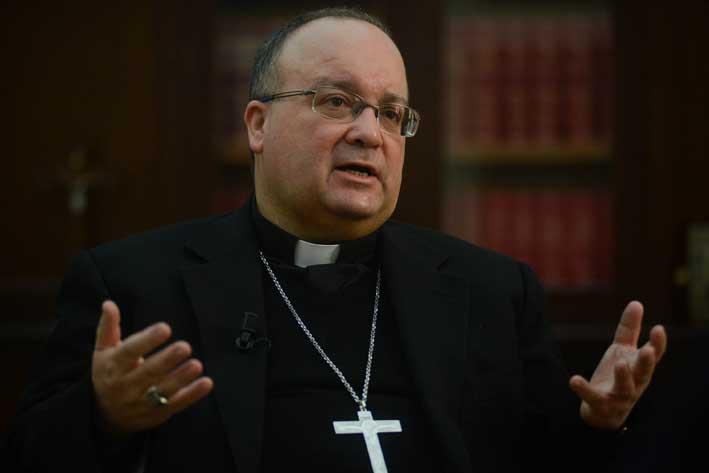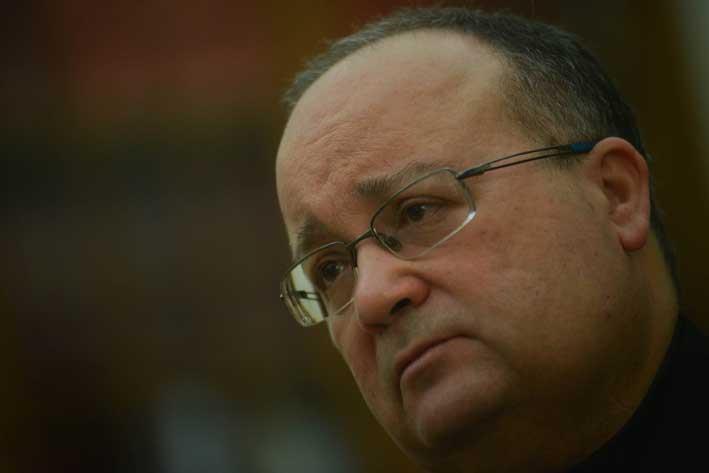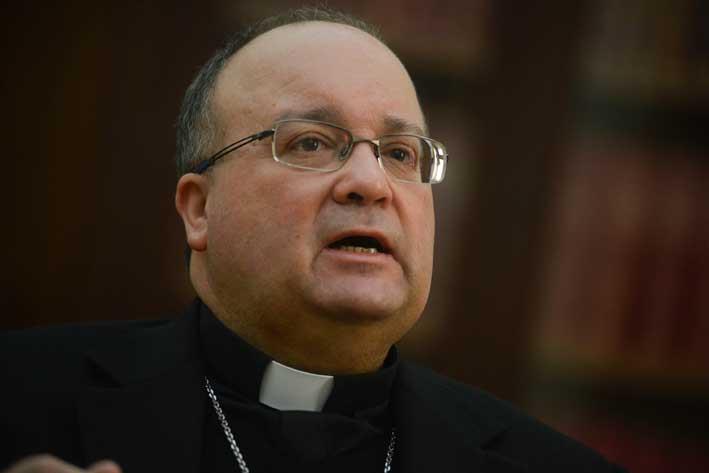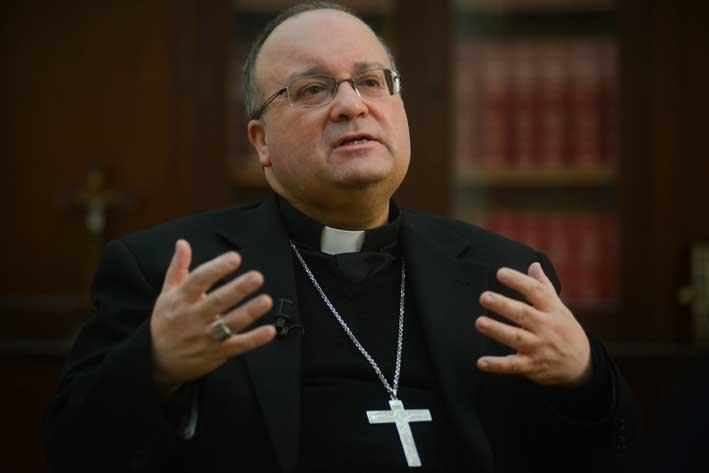“If people realise we are there to serve the common good and that we are responsible in the way we manage our money, then that is important. I believe we took a step in the right direction regarding decisions taken in the past, where property that was not needed was given to the government to use for a social purpose. The fact is, however, that investments do not yield as much as property would yield, so that was a great blow to our income”.
Mgr Scicluna has not noted any reduction in donations to the Church over the past 10 to 15 years.

“Donations are constant. I would say they’ve reached a plateau, but expenses are not the same. This is the problem we are facing. I’ve chosen to have people around me with different skills and expertise for the good of the church, but that means spending more money in order to offer the best possible service to our community. We need to get on with ministry which is adequate to the needs of the Church today, and I believe that if we do not waste, God will provide”.
If he had had the opportunity, the Archbishop says he would have negotiated the land transfer agreement between the Church and Maltese government differently. “I would have asked for more, in the way Oliver Twist did. The running price for one tumolo of land in the Agreement was Lm400 (€1,000), when this is now worth €15,000. So I would have upped the price a bit.”
Rising expenses can also be linked to the lack of young people taking up religious vocations.
“There is a full-blown crisis in Europe, in terms of women being drawn to religious life. Is it a question of a crisis in commitment, or a question of it being permanent? Is it because religious life must be transformed into something that is truly attractive for young people?
“We have so many young people who are attracted to voluntary work for example, but it’s seasonal. To make the leap to a lifelong commitment is probably more difficult for people nowadays. We also see this in terms of marriage and fidelity. There is always a difficulty for people to engage in a permanent commitment. I would say this affects young people’s availability to say ‘yes’ to a lifelong commitment to the priesthood or religious life”.
Asked whether, considering many children’s homes are run by nuns and given that not many women are choosing this vocation, there would be a problem in the future, he said: “We already have this problem. We’re talking about the past, not the future, in the sense that we have a few children’s homes run by nuns, but the staff are lay people. We are quickly moving towards a model where nuns have to abandon the work they have been doing with young children due to the lack of young nuns able to deliver a 24/7 service. We’re moving to a model where we must employ lay people who are not able to offer a 24/7 service due to family and work commitments. This also raises questions about screening and responsibility when it comes to the everyday running of these children’s homes”.

Mgr Scicluna made clear that these lay persons are not volunteers, but paid employees. “One realises that we have never costed and never really appreciated the unpaid contribution of hundreds of religious persons throughout the history of these islands. When you need to pay for the same service, you realise it’s not only about wages, but also about motivation and the extra sense of motherhood which nuns brought to so many generations of children.”
He stressed that, apart from needing to provide a good and up-to-standard service in this regard, “We must also continue the tradition that so many religious nuns and priests have given to society. We realise we cannot do it on our own, so the future for this is through an agreement with government and it would be a public-private partnership that would, to a certain extent, keep this service running. Expenses are becoming very prohibitive.”
Mgr Scicluna explained that Caritas, for example, already receives funds from the state. “It is not 100 per cent subsidised by the state, but these are important contributions that help. The state also realises that work undertaken by children’s homes, Caritas and Dar tal-Providenza are an important service to the community.”
The Archbishop’s first year
Mgr Scicluna believes that the life of an archbishop is made up of moments of anxiety and great joy.
“I cherish moments with my flock but I also enjoy being able to share liturgy with them. I’ve visited a number of parishes for feasts, however I have also shared other important moments, not only in my personal life, but also in the lives of the diocese.
“One decision I’ve taken is to lead funeral masses for priests, and this is always an emotional moment – when you have to bid farewell to a brother in the Priesthood. This year has been an eventful one for our family, particularly because of the death of my father, Emanuel, while we were in Rome for the Pallium pilgrimage. It was a very emotional experience for so many different reasons. It’s been a constant reminder of the beauty of life and the gratitude we have for the presence of our parents.”
Another emotional moment, he said, was the Christmas Day mass he celebrated at the Corradino Correctional Facility and the initiative by Caritas that followed later that day, where “a good, healthy and enjoyable Christmas meal for around 150 people was provided.”
The Archbishop spoke about the Pope’s Year of Mercy declaration. “It’s not only preaching mercy, but bringing the mercy of Jesus to individuals and communities in a very concrete way.”
In the light of recent scandals
Last year, Pope Francis made some strong declarations against corruption while in Naples. In the light of this, and the recent scandals in which Malta has been embroiled over the past years, the Archbishop was asked how the Maltese Catholic Church and Christians follow the Pope’s teachings.
“By listening to what he is saying and by creating a culture of accountability, transparency and a true civic sense, where people don’t create an atmosphere that allows for corruption.
“It does not take one person to create a corrupt society, it takes a whole milieu, where government is only seen as a way of progressing in one’s own interest. Even though we have been independent for 50 years, we still need to move away from a colonial style of relationship with government, and start saying that every decision will affect us all. We need to look at government as a service for the common good.”
Asked whether the church has been vocal enough in the wake of the number of scandals over the past few years, he referred people to his Independence Day speech. “I said we must respect each other when engaging with dialogue. I also said we need to develop the state’s civic sense, where I am not there for my own benefit, or to benefit my friends or the friends of my friends, but rather where a person in politics is there to provide a true service to the community. This is a message that must remain with us if we want to ensure good governance for future generations.”
The Archbishop was asked about the separation of church and state, and mentioned ‘mutual autonomy’.
“The right and freedom of the church to speak does not come from that relationship, but from the inherent freedom of a church to preach its message and convey its ideals to members of its faith community and society at large. I would draw a line where comments are partisan and I think that a Bishop should not go down that route. That does not mean that members from a faith community should shy away from politics. My prayer is for young people who cherish the catholic faith and who are also interested in politics as a service to the community, to do so”.
Time for female priests?
Mgr Scicluna was asked whether he believes it’s time for the Church to allow women to become priests. “Jesus took that decision 2,000 years ago and I’m not going to change his decision. There is a very important place for women in Church leadership, which is different from priesthood. We need to move away from leadership as being the sole and exclusive reserve of priests, who are male as they represent Jesus Christ who became a man.
“I believe there should be more leadership opportunities for women available, and I keep asking myself whether the Church in Malta should be more proactive in this regard. In constituting the new Diocese and Pastoral Council I am insisting on having a lady presiding over it, which would be a first for the Church in Malta. I am also very keen to have women form part of my councils, as that is a very important aspect to the Church’s ministry today”.

Time for married priests?
On the subject of the marriage of priests and celibacy “It’s on another level, as it developed over the last 1,300 years in the Latin Church. The oriental churches have a different discipline, allowing for married clergy. We have Catholic priests who are married, as the former Anglicans who joined the Catholic Church over the past few years were accepted as married clergy. This is something the Church could continue to discuss, as it is still on the agenda of a number of Bishops’ conferences. Having said that, I do understand that the Latin Church has always appreciated celibacy as an expression of close discipleship of Jesus, who chose to be celibate. In practical terms, it does give Catholic priesthood great freedom and a great sense of availability to go wherever a Bishop needs a priest to go.”
Gay marriage
The Archbishop explained the Church’s views on gay marriage. “Church teaching on marriage is very clear. The institution of marriage is a gift of creation. In creation, marriage is a union between a man and a woman who have a stable and permanent partnership and who are open to the gift of life through sexual intimacy. If that cannot happen, it is not a defect in the institution of marriage, however I believe that same-sex couples cannot offer what the institution of marriage in creation is all-about. This doesn’t mean they do not have their own dignity, or that civil unions are not a service to the dignity of these people. We should support legislation that gives same-sex partners their dignity and social protection.
“I believe that redefining marriage is not something that should be decided at a political party event, and it must be the subject of mature reflection. Whatever the State decides, the Church will exercise its freedom to keep preaching and promoting marriage as has been given in the order of creation. I feel that the State, in the paradigm of reciprocal autonomy, will recognise and respect the freedom of the Church to promote marriage as we have always known it.”
Asked whether there has been any official feedback on the Church’s position paper on the subject of conversion therapy, Archbishop Scicluna said: “Through our experts, we had very interesting discussions with Sylvan Agius, who is promoting the legislation. I know the caring professions have their own position, which I hope will be published soon. I feel the basic limits have been set, where everyone is against conversion therapy being forced on anyone. It’s important, however, to leave the professionals to exercise their profession according to their ethical standards. That is the main concern that must be respected in any legislation on the matter.”

Holy Week
Turning to Holy Week, the Archbishop said he had read “a beautiful meditation” by Bishop Mario Grech which was published in L’Oservatore Romano. “Bishop Grech said that a very important moment in the parable of the prodigal son is where the younger son stops and asks himself very searching questions. Holy Week is all about that, taking a break from our very hectic and almost alienating routine, and looking at Jesus Christ going through his death and resurrection while trying to understand what loving one’s friends means, what giving one’s life means and also what the hope of resurrection means.”
Photos Jonathan Borg